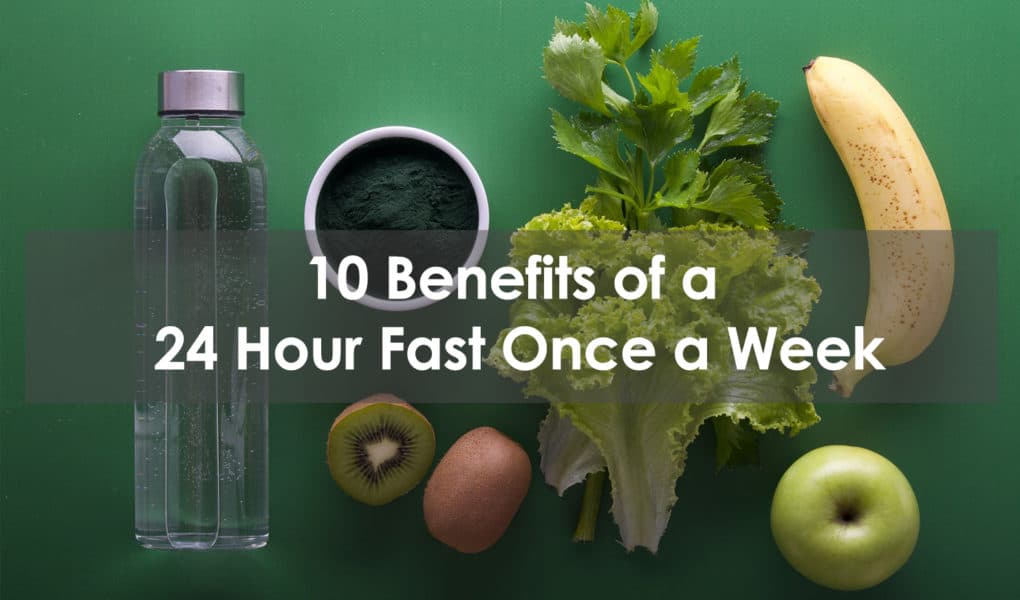The practice of fasting is one that involves restricting yourself from consuming food for a certain period of time. There are various forms of fasting, for example, intermittent fasting, and all have their own health benefits.
24-hour fasts – in which you don’t eat any food for at least 24 hours – can actually help your body and overall health in a variety of ways, provided it is done properly.
These fasts also don’t need to be done constantly – even just once a week is enough to reap some of these health benefits. Here, we’ll look at 10 lifestyle benefits of 24-hour fasts.
1. Fat Loss

Any lengthened periods of fasting help with weight loss, because you are limiting the number of calories you are consuming. In order to lose weight and reduce body fat, you need to be in a calorie deficit; consuming fewer calories than you are burning.
By introducing a 24-hour fasting period once a week, you are greatly reducing your caloric intake, thus placing yourself in that energy deficit to promote weight loss.
Plus, while in this fasted state, your body will use fat stores for energy, rather than the sugar you would usually get from food, which further adds to weight loss.
2. Blood Sugar Control

Regularly undergoing hours of fasting can decrease your insulin resistance, which is good news for your blood sugar levels. If your insulin resistance is high, then your blood sugar levels will also remain high and this increases your chances of developing type 2 diabetes.
By reducing insulin resistance, your body becomes more sensitive to insulin (which is a good thing) and is able to transport glucose from your bloodstream to your cells much more efficiently.
Being in a fasted state can also help regulate your blood sugar and insulin levels, thus preventing spikes and crashes which will, in turn, regulate your energy levels.
3. Simple To Follow
One of the biggest benefits of 24-hour fasts, particularly in comparison to other fasts, is that they are very simple to complete. You don’t need to work out specific timings, like with intermittent fasting; you just need to take note of your last meal.
For example, a 24-hour fast could look like this: you eat dinner in the evening and take note of the time. You go to bed, wake up the next day and go about your day, drinking plenty of water. You skip lunch also, and then in the evening, you eat dinner, once you’ve moved past the time of the previous day’s.
4. Fights Inflammation
While acute inflammation is your body’s natural response to fighting off things like infections, chronic inflammation – which is much longer-term – can have damaging effects and lead to health complications, such as heart disease.
Studies have shown that fasting – including 24-hour fasts – can help fight against chronic inflammation. This then lowers your risk of developing chronic diseases and other health conditions, including multiple sclerosis.
5. Boosts Brain Function

There have also been studies that show other potential health benefits of fasting; improving brain function and protecting against neurodegenerative disorders. Though these have mostly been animal studies so far, they have shown fasting to improve cognitive function in mice, and scientists believe this could also translate to humans as well.
Inflammation can also lead to disorders such as Alzheimer’s disease and Parkinson’s, and some of these animals’ studies have shown that fasting can help protect against these.
Of course, boosting cognitive function will have far-reaching impacts, including an increase in alertness, faster nerve-to-cell response times, and improved performance.
6. Enhances Heart Health
Fasting – in particular alternate-day fasting – has been proven to also be beneficial for your overall heart health. Heart disease is the leading cause of death around the world, accounting for almost a third of all deaths.
Research has revealed that different types of fasting can lower the “bad” LDL cholesterol and blood triglycerides in your system, thus reducing your risk of cardiovascular diseases. Such changes to your diet can also reduce blood pressure and cholesterol levels and protect against diabetes.
7. Boosts Metabolism
As well as aiding in weight loss due to daily calorie restriction, fasting can actually enhance your metabolic rate (how quickly your body burns calories). Though caloric restriction is how you will achieve weight loss, having a faster metabolism will help your body to burn through more calories per day.
Introducing a 24-hour fasting habit into your weekly routine – perhaps a couple of times per week – can enhance your metabolism over time.
8. Regulates Hormones
Hunger and the feeling of fullness are actually linked to hormones – ghrelin and leptin respectively – and fasting for longer periods of time can help regulate these hormones so that they remain at healthy levels.
Ghrelin regulates your feelings of hunger; if you have low levels of this hormone, you will feel hungry more, whereas higher levels will reduce this feeling. Leptin, on the other hand, tells us when we are full – so, if you have high levels of leptin, you will need to eat more food to feel full. Obese people tend to have high levels of leptin and lower levels of ghrelin.
Fasting for a lengthy time period – such as 24 hours – can help regulate these hormones over time and bring them to healthier levels so that you don’t end up overeating.
9. Boosts Your Immune System
This one might seem counterintuitive, as we need nutrients from food to help fight off illness and bolster our immune system. However, studies have shown that fasting for stretches of time actually builds tissue immunity within the body.
It is theorized that this is because evolution has conditioned the human body to be used to low-calorie intake and going without food for periods of time. Whatever the case, periods of fasting can help make your immune system more robust and more effectively fight off infections.
10. Helps You Live Longer

As we age and grow, old proteins and toxins tend to build up in our system and ‘clog’ it up, which speeds up the aging process and can lead to health complications. However, periodic fasting can fight against this process and promote a natural response called autophagy.
This is essentially a ‘clearing out’ process where these old toxins are removed from the body, allowing it to regenerate and repair cells. This not only helps fight against illnesses like dementia but also slows down the aging process.
Conclusion
Periodic fasting can have a surprising number of benefits to your health, so it’s worth considering introducing a 24-hour fast into your weekly routine. It’s relatively simple to implement and can work wonders for your heart, brain, metabolism, and immune system.
Frequently Asked Questions
Should you work out during a 24 hour fast?
You can exercise while in a fasted state, though it’s best to avoid overly strenuous workouts as your body will not have as much energy to draw upon, and this can lead to injury. Try to schedule your fasting day as a rest day from exercise, or alternatively only take part in relatively calm forms of exercise.







